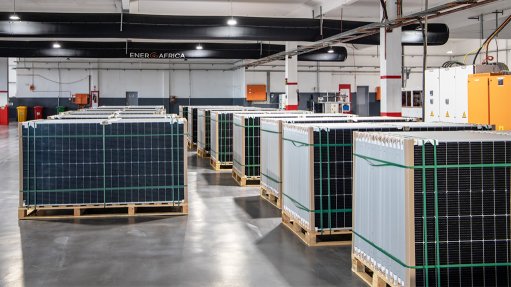Innovation and collaboration take centre stage in decarbonisation

Decarbonisation in Mining_ The journey to cutting carbon emissions related to mineral resources new
Mining companies are leading the charge in decarbonisation, making significant strides. Yet, challenges persist, emphasising the need for collaborative efforts and innovation to strengthen this commitment.
This was the central message conveyed by speakers during Creamer Media’s 'Decarbonisation in Mining: The journey to cutting carbon emissions related to mineral resources' webinar, held on September 20.
Sibanye-Stillwater Energy and Decarbonisation senior manager Jevon Martin pointed to the mining industry’s pivotal position in global decarbonisation efforts. He outlined three key avenues for the industry’s impact: producing green metals, reducing greenhouse-gas emissions and responding to customer demands.
African Clean Energy Developments GM James Cumming commended the sector’s response to new regulations, noting that the recent deregulation of the energy sector was enabling mining sector clients to undertake renewable energy projects.
The new regulations have considerably bolstered the level of procurement, which bodes well for the clean energy pipeline and the country as a whole, while assisting in serving mining companies’ energy needs.
He called for this level to be maintained moving forward; and said that the next major step would be fixing the grid constraints.
Continuing the discussion, Engie South Africa business developer Shahil Juggernath said that decarbonisation might seem a “daunting” task, given the mining industry’s substantial energy consumption. However, he sees promise as the grid strengthens and technology improves, making renewable energy integration more feasible.
Many mining companies are committed to renewable energy targets and to decarbonisation, with lots of work around this and securing energy supply. However, Juggernath emphasised that local innovation must be stepped up, with endeavours currently under way to try out new solutions, including using green hydrogen to solve many of the challenges in the mining sector.
Juggernath highlighted that these innovations aligned with South Africa’s just energy transition, benefitting localisation and employment, while simultaneously reaching decarbonisation targets.
Decarbonisation, however, is not without its challenges. Martin noted that it was a universal concern, not limited to the mining industry. Collaboration among mining companies and similar-minded partners was crucial.
Martin outlined challenges such as technology availability and the need to navigate project financing and grid constraints to unlock decarbonisation potential.
He added that there was a need to balance decarbonisation with the commercial impact on mining operations, suggesting a managed transition over an asset’s lifespan.
He also highlighted the importance of mining houses investing in innovation.
Shell Services manager Mpho Mokwena reiterated this stance, noting that the mining industry was on the right track. He stressed that it was critical for organisations to have clear decarbonisation strategies, so that solutions could be designed holistically to support these goals.
He pointed out that while there were cost implications for decarbonisation solutions, this was a dynamic process in which technology perpetually evolved. Mokwena also emphasised the need to engage local communities as part of this process. For example, he noted that Shell was proactively pursuing these opportunities with its mining partners, with it currently working on a project to implement circularity of its products from when it delivered to when it collected and repurposed waste oil.
This would entail actively involving local small, medium-sized and microenterprises to collect the oil.
Article Enquiry
Email Article
Save Article
Feedback
To advertise email advertising@creamermedia.co.za or click here
Announcements
What's On
Subscribe to improve your user experience...
Option 1 (equivalent of R125 a month):
Receive a weekly copy of Creamer Media's Engineering News & Mining Weekly magazine
(print copy for those in South Africa and e-magazine for those outside of South Africa)
Receive daily email newsletters
Access to full search results
Access archive of magazine back copies
Access to Projects in Progress
Access to ONE Research Report of your choice in PDF format
Option 2 (equivalent of R375 a month):
All benefits from Option 1
PLUS
Access to Creamer Media's Research Channel Africa for ALL Research Reports, in PDF format, on various industrial and mining sectors
including Electricity; Water; Energy Transition; Hydrogen; Roads, Rail and Ports; Coal; Gold; Platinum; Battery Metals; etc.
Already a subscriber?
Forgotten your password?
Receive weekly copy of Creamer Media's Engineering News & Mining Weekly magazine (print copy for those in South Africa and e-magazine for those outside of South Africa)
➕
Recieve daily email newsletters
➕
Access to full search results
➕
Access archive of magazine back copies
➕
Access to Projects in Progress
➕
Access to ONE Research Report of your choice in PDF format
RESEARCH CHANNEL AFRICA
R4500 (equivalent of R375 a month)
SUBSCRIBEAll benefits from Option 1
➕
Access to Creamer Media's Research Channel Africa for ALL Research Reports on various industrial and mining sectors, in PDF format, including on:
Electricity
➕
Water
➕
Energy Transition
➕
Hydrogen
➕
Roads, Rail and Ports
➕
Coal
➕
Gold
➕
Platinum
➕
Battery Metals
➕
etc.
Receive all benefits from Option 1 or Option 2 delivered to numerous people at your company
➕
Multiple User names and Passwords for simultaneous log-ins
➕
Intranet integration access to all in your organisation



















